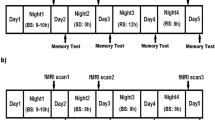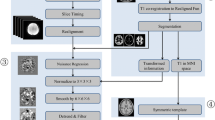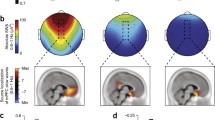Abstract
Acute sleep restriction heavily influences cognitive function, affecting executive processes such as attention, response inhibition, and memory. Previous neuroimaging studies have suggested a link between hippocampal activity and short-term memory function. However, the specific contribution of the hippocampus to the decline of short-term memory following sleep restriction has yet to be established. In the current study, we utilized resting-state functional magnetic resonance imaging (fMRI) to examine the association between hippocampal functional connectivity (FC) and the decline of short-term memory following total sleep deprivation (TSD). Twenty healthy adult males aged 20.9 ± 2.3 years (age range, 18–24 years) were enrolled in a within-subject crossover study. Short-term memory and FC were assessed using a Delay-matching short-term memory test and a resting-state fMRI scan before and after TSD. Seed-based correlation analysis was performed using fMRI data for the left and right hippocampus to identify differences in hippocampal FC following TSD. Subjects demonstrated reduced alertness and a decline in short-term memory performance following TSD. Moreover, fMRI analysis identified reduced hippocampal FC with the superior frontal gyrus (SFG), temporal regions, and supplementary motor area. In addition, an increase in FC between the hippocampus and bilateral thalamus was observed, the extent of which correlated with short-term memory performance following TSD. Our findings indicate that the disruption of hippocampal–cortical connectivity is linked to the decline in short-term memory observed after acute sleep restriction. Such results provide further evidence that support the cognitive impairment model of sleep deprivation.



Similar content being viewed by others
References
Alger, S. E., Chambers, A. M., Cunningham, T., & Payne, J. D. (2014). The Role of Sleep in Human Declarative Memory Consolidation. 25, 269–306.
Anderson, C., & Platten, C. R. (2011). Sleep deprivation lowers inhibition and enhances impulsivity to negative stimuli. Behavioural Brain Research, 217(2), 463–466.
Bird, C. M., & Burgess, N. (2008). The hippocampus and memory: insights from spatial processing. Nature Reviews Neuroscience, 9(3), 182–194.
Cabeza, R., Dolcos, F., Prince, S. E., Rice, H. J., Weissman, D. H., & Nyberg, L. (2003). Attention-related activity during episodic memory retrieval: a cross-function fMRI study. Neuropsychologia, 41(3), 390–399.
Chee, M. W. L., & Chuah, L. Y. M. (2008). Functional neuroimaging insights into how sleep and sleep deprivation affect memory and cognition. Current Opinion in Neurology, 21(4), 417–423. doi:10.1097/WCO.0b013e3283052cf7.
Curran, T. (2004). Effects of attention and confidence on the hypothesized ERP correlates of recollection and familiarity. Neuropsychologia, 42(8), 1088–1106.
De Havas, J. A., Parimal, S., Soon, C. S., & Chee, M. W. L. (2012). Sleep deprivation reduces default mode network connectivity and anti-correlation during rest and task performance. NeuroImage, 59(2), 1745–1751. doi:10.1016/j.neuroimage.2011.08.026.
Diekelmann, S., & Born, J. (2010). The memory function of sleep. Nature Reviews Neuroscience, 11(2), 114–126.
Dolcos, F., Iordan, A. D., Kragel, J., Stokes, J., Campbell, R., McCarthy, G., & Cabeza, R. (2013). Neural correlates of opposing effects of emotional distraction on working memory and episodic memory: an event-related FMRI investigation. Frontiers in Psychology, 4, 293.
Durmer, J. S., & Dinges, D. F. (2005). Neurocognitive consequences of sleep deprivation. In Seminars in neurology, 25, 117–129.
Eichenbaum, H., Sauvage, M., Fortin, N., Komorowski, R., & Lipton, P. (2012). Towards a functional organization of episodic memory in the medial temporal lobe. Neuroscience & Biobehavioral Reviews, 36(7), 1597–1608.
Fell, J., Klaver, P., Lehnertz, K., Grunwald, T., Schaller, C., Elger, C. E., & Fernández, G. (2001). Human memory formation is accompanied by rhinal–hippocampal coupling and decoupling. Nature Neuroscience, 4(12), 1259–1264.
Fjell, A. M., McEvoy, L., Holland, D., Dale, A. M., Walhovd, K. B., & Initiative, A. D. N. (2014). What is normal in normal aging? Effects of aging, amyloid and Alzheimer’s disease on the cerebral cortex and the hippocampus. Progress in Neurobiology, 117, 20–40.
Fox, M. D., Zhang, D., Snyder, A. Z., & Raichle, M. E. (2009). The global signal and observed anticorrelated resting state brain networks. Journal of Neurophysiology, 101(6), 3270–3283. doi:10.1152/jn.90777.2008.
Havekes, R., Vecsey, C. G., & Abel, T. (2012). The impact of sleep deprivation on neuronal and glial signaling pathways important for memory and synaptic plasticity. Cellular Signalling, 24(6), 1251–1260.
Holmes, M., Folley, B. S., Sonmezturk, H. H., Gore, J. C., Kang, H., Abou-Khalil, B., & Morgan, V. L. (2014). Resting state functional connectivity of the hippocampus associated with neurocognitive function in left temporal lobe epilepsy. Human Brain Mapping, 35(3), 735–744.
Izquierdo, I., & Medina, J. H. (1997). Memory formation: the sequence of biochemical events in the hippocampus and its connection to activity in other brain structures. Neurobiology of Learning and Memory, 68(3), 285–316.
Krasuski, J. S., Alexander, G. E., Horwitz, B., Rapoport, S. I., & Schapiro, M. B. (2014). Relation of medial temporal lobe volumes to age and memory function in nondemented adults with Down’s syndrome: Implications for the prodromal phase of Alzheimer’s disease. American Journal of Psychiatry, 159(1), 74-81.
Kumar, T., & Jha, S. K. (2012). Sleep deprivation impairs consolidation of cued fear memory in rats. 7(10), e47042
Kwon, D., Maillet, D., Pasvanis, S., Ankudowich, E., Grady, C. L., & Rajah, M. N. (2015). Context memory decline in middle aged adults is related to changes in prefrontal cortex function. Cerebral Cortex, 26(6), 2440–2460.
Leavitt, V. M., Wylie, G. R., Girgis, P. A., DeLuca, J., & Chiaravalloti, N. D. (2014). Increased functional connectivity within memory networks following memory rehabilitation in multiple sclerosis. Brain Imaging and Behavior, 8(3), 394–402.
Lee, K. A., Hicks, G., & Nino-Murcia, G. (1991). Validity and reliability of a scale to assess fatigue. Psychiatry Research, 36(3), 291–298.
Lim, J., & Dinges, D. F. (2008). Sleep deprivation and vigilant attention. Annals of the New York Academy of Sciences, 1129, 305–322. doi:10.1196/annals.1417.002.
Luber, B., Steffener, J., Tucker, A., Habeck, C., Peterchev, A. V., Deng, Z.-D., et al. (2013). Extended remediation of sleep deprived-induced working memory deficits using fMRI-guided transcranial magnetic stimulation. Sleep, 36(6), 857.
Maguire, E. A., Vargha-Khadem, F., & Mishkin, M. (2001). The effects of bilateral hippocampal damage on fMRI regional activations and interactions during memory retrieval. Brain, 124(6), 1156–1170.
Mander, B. A., Rao, V., Lu, B., Saletin, J. M., Ancoli-Israel, S., Jagust, W. J., & Walker, M. P. (2013). Impaired prefrontal sleep spindle regulation of hippocampal-dependent learning in older adults. Cerebral Cortex, 24(12), 3301–3309.
Menz, M. M., Rihm, J. S., Salari, N., Born, J., Kalisch, R., Pape, H. C., et al. (2013). The role of sleep and sleep deprivation in consolidating fear memories. NeuroImage, 75, 87–96.
Murphy, K., Birn, R. M., Handwerker, D. a., Jones, T. B., & Bandettini, P. A. (2009). The impact of global signal regression on resting state correlations: are anti-correlated networks introduced? NeuroImage, 44(3), 893–905. doi:10.1016/j.neuroimage.2008.09.036.
Phelps, E. A. (2004). Human emotion and memory: interactions of the amygdala and hippocampal complex. Current Opinion in Neurobiology, 14(2), 198–202.
Service, P., Service, P., & Diego, S. (2006). Effects of two nights sleep deprivation and two nights recovery sleep on response inhibition, 4201, 261–265.
Shao, Y., Wang, L., Ye, E., Jin, X., Ni, W., Yang, Y., et al. (2013). Decreased thalamocortical functional connectivity after 36 hours of total sleep deprivation: evidence from resting state FMRI. PloS One, 8(10), e78830. doi:10.1371/journal.pone.0078830.
Sidhu, M. K., Stretton, J., Winston, G. P., Bonelli, S., Centeno, M., Vollmar, C., et al. (2013). A functional magnetic resonance imaging study mapping the episodic memory encoding network in temporal lobe epilepsy. Brain, 136(6), 1868–1888.
Tallon-Baudry, C., Bertrand, O., Peronnet, F., & Pernier, J. (1998). Induced γ-band activity during the delay of a visual short-term memory task in humans. The Journal of Neuroscience, 18(11), 4244–4254.
Tallon-Baudry, C., Kreiter, A., & Bertrand, O. (1999). Sustained and transient oscillatory responses in the gamma and beta bands in a visual short-term memory task in humans. Visual Neuroscience, 16(03), 449–459.
van de Ven, V. G., Formisano, E., Prvulovic, D., Roeder, C. H., & Linden, D. E. J. (2004). Functional connectivity as revealed by spatial independent component analysis of fMRI measurements during rest. Human Brain Mapping, 22(3), 165–178.
Van Dijk, K. R. A., Sabuncu, M. R., & Buckner, R. L. (2012). The influence of head motion on intrinsic functional connectivity MRI. NeuroImage, 59(1), 431–438. doi:10.1016/j.neuroimage.2011.07.044.
Voets, N. L., Zamboni, G., Stokes, M. G., Carpenter, K., Stacey, R., & Adcock, J. E. (2014). Aberrant functional connectivity in dissociable hippocampal networks is associated with deficits in memory. The Journal of Neuroscience, 34(14), 4920–4928.
Ward, A. M., Schultz, A. P., Huijbers, W., Dijk, K. R. A., Hedden, T., & Sperling, R. A. (2014). The parahippocampal gyrus links the default-mode cortical network with the medial temporal lobe memory system. Human Brain Mapping, 35(3), 1061–1073.
Ward, A. M., Mormino, E. C., Huijbers, W., Schultz, A. P., Hedden, T., & Sperling, R. A. (2015). Relationships between default-mode network connectivity, medial temporal lobe structure, and age-related memory deficits. Neurobiology of Aging, 36(1), 265–272.
Wittenberg, G. M., & Tsien, J. Z. (2002). An emerging molecular and cellular framework for memory processing by the hippocampus. Trends in Neurosciences, 25(10), 501–505.
Xu, W., & Südhof, T. C. (2013). A neural circuit for memory specificity and generalization. Science, 339(6125), 1290–1295.
Yoo, S.-S., Gujar, N., Hu, P., Jolesz, F. A., & Walker, M. P. (2007a). The human emotional brain without sleep—a prefrontal amygdala disconnect. Current Biology, 17(20), R877–R878.
Yoo, S.-S., Hu, P. T., Gujar, N., Jolesz, F. A., & Walker, M. P. (2007b). A deficit in the ability to form new human memories without sleep. Nature Neuroscience, 10(3), 385–392.
Zeng, L., Wang, D., Fox, M. D., Sabuncu, M. R., Hu, D., Ge, M., et al. (2014). Neurobiological basis of head motion in brain imaging. Proceedings of the National Academy of Sciences of the United States of America, 111(16), 6058–6062. doi:10.1073/pnas.1317424111.
Zou, Q., Ross, T. J., Gu, H., Geng, X., Zuo, X.-N. X., Hong, L. E., et al. (2013). Intrinsic resting-state activity predicts working memory brain activation and behavioral performance. Human Brain Mapping, 34(12), 3204–3215. doi:10.1002/hbm.22136.
Author information
Authors and Affiliations
Corresponding authors
Ethics declarations
Funding
This work was supported by the National Military Science Foundation of China, No. AWS14J011.
Conflict of interest
None.
Ethical approval
All procedures performed in studies involving human participants were in accordance with the ethical standards of the institutional and/or national research committee and with the 1964 Helsinki declaration and its later amendments or comparable ethical standards.
Informed consent
Informed consent was obtained from all individual participants included in the study.
Additional information
Li Chengyang, Huang Daqing and Chang Haisheng contributed equally to this work.
Rights and permissions
About this article
Cite this article
Chengyang, L., Daqing, H., Jianlin, Q. et al. Short-term memory deficits correlate with hippocampal-thalamic functional connectivity alterations following acute sleep restriction. Brain Imaging and Behavior 11, 954–963 (2017). https://doi.org/10.1007/s11682-016-9570-1
Published:
Issue Date:
DOI: https://doi.org/10.1007/s11682-016-9570-1




